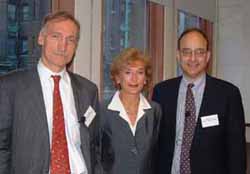The Role of Federal Government in Vocational Education
Opening remarks were given by Thomas Bailey, the George and Abby O'Neill Professor of Economics and Education and Director of CCRC and the Institute on Education and the Economy. Bailey said that this panel had good timing since the national budget proposal was made public earlier that week. It included the reauthorization for federal funding of vocational education. D'Amico was part of that reauthorization.
Jim Jacobs, Associate Director of CCRC, spoke first about the future of post-secondary vocational education. He talked about the state of the field including the increased enrollment in community colleges, the diverse constituents, how it is the only nationally recognized system of workforce education for adults, and about the colleges being unsettled as to where they fit in the landscape with other training institutions.
The dominance of the office economy, the end of linear education, competition from private and public schools and the increasing emphasis on accountability is driving community colleges. As a result, they need to think about how to deal with funding cut-backs and increased enrollments, who they are serving and what are their priorities and how to supplement what's done inside the classroom including counseling and recruiting.
"This is an exciting period and an opportunity to focus more on areas of growth in adult education," concluded Jacobs. "It's a situation where we can develop and grow if we seize the opportunity."
Then, D'Amico, who has worked at a community college and has studied them, talked about the emerging world of vocational education and how the new changes will improve the original Smith-Hughes Act of 1917, which isolated vocational education from other parts of the high school curriculum to serve an industrial society. Despite efforts to improve it, it has remained fairly unchanged until now, she said.
In reexamining the Act, the government decided that a vocational education should prepare students for a job, but also help them have the ability to move up or move on. "Education must expand our circles, not limit them," said D'Amico. "A successful carpenter must abandon his love of literature? Or an engineer must give up the arts? Or if choosing to work with your hands means giving up writing? Then, perhaps we failed in education."
Since the average worker will change jobs four or five times in his or her life and 80 percent of the jobs in the future will require tech training and education beyond high school, the government decided that it should focus on raising the achievement at the high school level and curriculum that connects to the community college level.
The goal of the new $1 billion program called "Secondary Technical Excellence Program," is that every youth will graduate high school with the academic knowledge and skills to successfully transition to postsecondary education without remediation. It will prepare students for a specific job while giving them the tools and information to adapt so that workers in the United States can compete with workers all over the world in this global economy.
"It isn't only what we teach, but what we expect that makes a difference," said D'Amico. It is the rigor that makes a difference." This program is modeled after the No Child Left Behind Act.
In her position, D'Amico serves as principal adviser to the U.S. Secretary of Education on all matters related to vocational and adult education. She is a nationally recognized expert on workforce development and education issues, a published author, and frequently requested speaker. Prior to her appointment, she served as Dean for Workforce Development at Ivy Tech Community College of Indiana. In addition to her prior positions in government and higher education, she co-authored Workforce 2020: Work and Workers in the 21st Century. D'Amico earned an Ed.D. in leadership and policy studies and M.S. in adult education from Indiana.
Published Monday, Mar. 3, 2003
